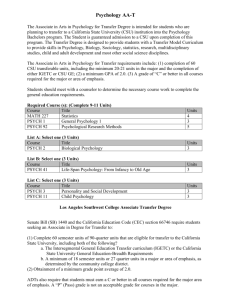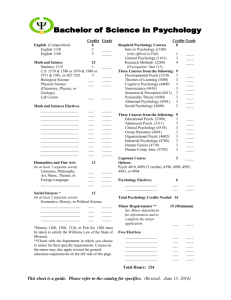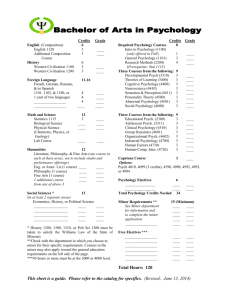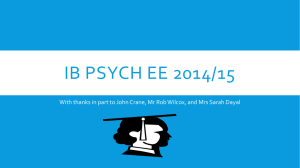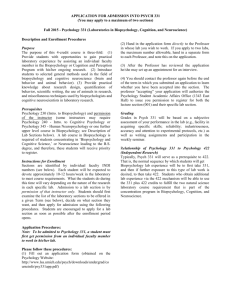Unit I & II
advertisement
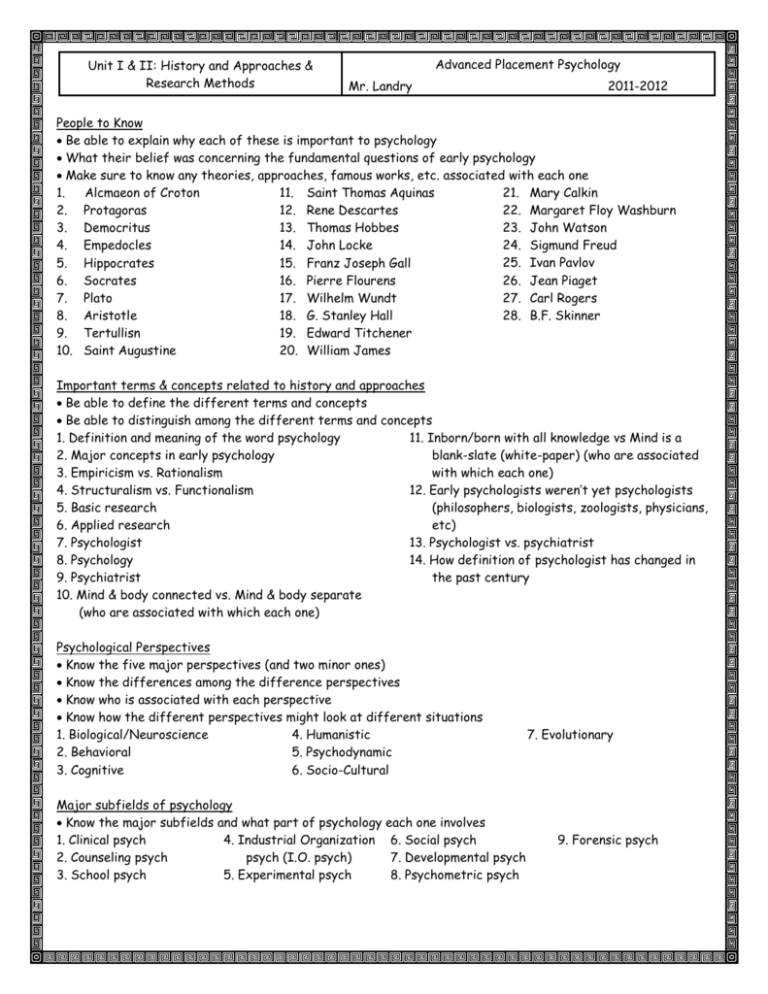
Unit I & II: History and Approaches & Research Methods Advanced Placement Psychology Mr. Landry 2011-2012 People to Know Be able to explain why each of these is important to psychology What their belief was concerning the fundamental questions of early psychology Make sure to know any theories, approaches, famous works, etc. associated with each one 1. Alcmaeon of Croton 11. Saint Thomas Aquinas 21. Mary Calkin 2. Protagoras 12. Rene Descartes 22. Margaret Floy Washburn 3. Democritus 13. Thomas Hobbes 23. John Watson 4. Empedocles 14. John Locke 24. Sigmund Freud 25. Ivan Pavlov 5. Hippocrates 15. Franz Joseph Gall 6. Socrates 16. Pierre Flourens 26. Jean Piaget 7. Plato 17. Wilhelm Wundt 27. Carl Rogers 8. Aristotle 18. G. Stanley Hall 28. B.F. Skinner 9. Tertullisn 19. Edward Titchener 10. Saint Augustine 20. William James Important terms & concepts related to history and approaches Be able to define the different terms and concepts Be able to distinguish among the different terms and concepts 1. Definition and meaning of the word psychology 11. Inborn/born with all knowledge vs Mind is a 2. Major concepts in early psychology blank-slate (white-paper) (who are associated 3. Empiricism vs. Rationalism with which each one) 4. Structuralism vs. Functionalism 12. Early psychologists weren’t yet psychologists 5. Basic research (philosophers, biologists, zoologists, physicians, 6. Applied research etc) 7. Psychologist 13. Psychologist vs. psychiatrist 8. Psychology 14. How definition of psychologist has changed in 9. Psychiatrist the past century 10. Mind & body connected vs. Mind & body separate (who are associated with which each one) Psychological Perspectives Know the five major perspectives (and two minor ones) Know the differences among the difference perspectives Know who is associated with each perspective Know how the different perspectives might look at different situations 1. Biological/Neuroscience 4. Humanistic 2. Behavioral 5. Psychodynamic 3. Cognitive 6. Socio-Cultural Major subfields of psychology Know the major subfields and what part of psychology each one involves 1. Clinical psych 4. Industrial Organization 6. Social psych 2. Counseling psych psych (I.O. psych) 7. Developmental psych 3. School psych 5. Experimental psych 8. Psychometric psych 7. Evolutionary 9. Forensic psych Important terms and concepts related to methods of research • Be able to explain why do we need psychology • Scatterplot • Hindsight bias • Perfect positive correlation +1 • Overconfidence • Perfect negative correlation -1 • Scientific method • Correlation does not mean causation • Parts/steps of the scientific method: • Illusory correlation • Developing a hypothesis/theory • Cause and effect • Performing a method of research • Make sure you know what the cause and the effect • Gathering objective data • Parts of experiments • Analyzing the results and accepting or • Methods of eliminating or lessening bias rejecting the hypothesis • (Single) blind • Publishing, criticizing, and replicating the • Double blind (know difference between) results • Know the difference between Independent • Replication – reasons for variable & Dependent variable • Know the three main methods/strategies of • Control variables research • Placebo • Know the Pros and Cons of each of the three main • Placebo effect methods/strategies • Counterbalance o Descriptive • Confounding variables o Correlational • Random selection & Random sampling o Experimental • Random selection & Random sampling vs. Random • Descriptive assignment • Know the Three main types of the Descriptive • Statistics Method/Strategy • Mean o Case study • Mode o Survey • Median o Naturalistic Observation • Range • Hawthorne Effect • Standard deviation • Longitudinal study • Statistical significance • Know the major issues regarding surveys • What are measures of central tendency? What • Wording effect ways are used to measure central tendency? • Sampling • What are the measures of variation? What are • Population the ways to measure variation? • Random sampling • APA ethical principles for the treatment of human • Self-selecting participants • Correlational • Correlation coefficient FRQ terms 1. Empiricism 2. Structuralism 3. Functionalism 4. Psychology 5. Nature-nurture issue 6. Natural selection 7. Basic research 8. Applied research 9. Clinical psychology 10. Psychiatrist 11. Case study 12. Control condition 13. Correlation coefficient 14. Critical thinking 15. Culture 16. Dependent variable 17. Double-blind procedure 18. Experiment 19. Experimental condition 20. False consensus effect 21. Hindsight bias 22. Hypothesis 23. Illusory correlation 24. Independent variable 25. Mean 26. Median 27. Mode 28. Naturalistic observation 29. Operational definition 30. Placebo effect 31. Population 32. Random assignment 33. Random sampling 34. Range 35. Replication 36. Scatterplot 37. Standard deviation 38. Statistical significance 39. Survey 40. Theory Vocabulary: Due the day of the test 1. Rationalism 6. Experimental group 2. Introspection 7. Experimenter bias 3. Confounding variables 8. Hawthorne Effect 4. Control group 9. Measures of Central Tendency 5. Counterbalancing 10. Measures of Variation 11. Overconfidence 12. Placebo 13. Random selection 14. Single-blind procedure Previous test question breakdown n/a Reading assignment due dates Reading: 1-17 “A” Reading: 19-36 “A” Reading: 37-45 (46-53) “A” Test/outline/vocab “A” Day: Friday, September 2nd/”B” Day: Tuesday, September 6th Day: Thursday, September 8th /”B” Day: Friday, September 9th Day: Monday, September 13th /”B” Day: Tuesday, September 14th Day: Wednesday, September 15th /”B” Day: Thursday, September 16th

